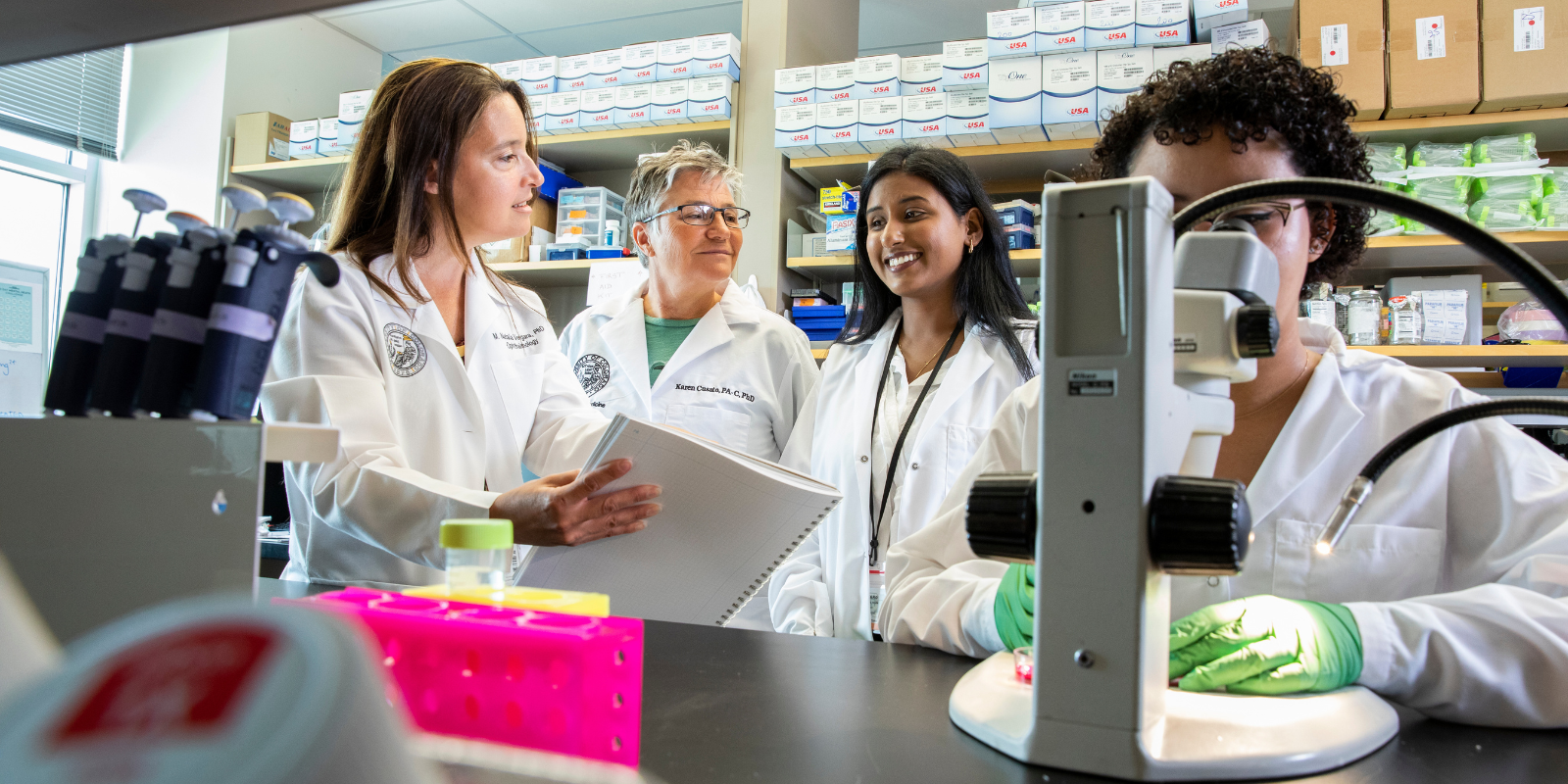As we close the books on 2022, it’s worth looking back to see how far we have come this year. The communications staff in the University of Colorado School of Medicine Dean’s Office covered a variety of stories from the Sue Anschutz-Rodgers Eye Center, from welcoming new faculty to sending off the next generation of eye doctors into the field, pioneering new treatments for blinding diseases, and winning recognition for groundbreaking research.
These are the top stories from a year to remember.
Jayashree Kalpathy-Cramer, PhD, Named Chief of Artificial Medical Intelligence in Ophthalmology
Jayashree Kalpathy-Cramer, PhD, was named chief of the new Division of Artificial Medical Intelligence in Ophthalmology at the CU School of Medicine in March. Starting her new role in May, Kalpathy-Cramer has focused on translating novel artificial intelligence (AI) methods into effective patient care practices at the Sue Anschutz-Rodgers Eye Center.
“This is a phenomenal opportunity. Artificial intelligence has so many potential uses in ophthalmology, and CU is a great place to deploy AI to advance patient care,” Kalpathy-Cramer says. “Ophthalmologists have been working in AI for a while, but now we have an opportunity to take it to the next level and make a meaningful difference.”
Treating Metastatic Uveal Melanoma
Brigette Douglass was diagnosed 13 years ago with uveal melanoma, a subset of ocular melanoma that affects pigmented tissue inside the eye. Thinking she had a retinal detachment, her diagnosis came as a shock.
Douglass enrolled in a clinical trial of tebentafusp (Kimmtrak), a groundbreaking immunotherapy drug, six years ago. She and her family moved to Colorado in 2019 when the clinical trial became available at the CU Cancer Center. In January, tebentafusp was approved by the Food and Drug Administration (FDA).
We spoke to Douglass about how this revolutionary treatment has allowed her to embrace family, career, and world travel adventures while also becoming one of the longest-participating patients in a clinical trial for metastatic uveal melanoma.
CU Researchers Provide First Evidence Linking Extracellular Vesicles with Drusen Formation and Age-Related Macular Degeneration
Researchers in the Department of Ophthalmology’s ocular stem cell and regeneration research program, CellSight, offered the first evidence connecting drusen formation, or yellowish deposits that accumulate under the retina, with extracellular vesicles and age-related macular degeneration (AMD).
Published in the Journal of Extracellular Vesicles (2020 impact factor 25.8), Miguel Flores-Bellver, PhD, and Valeria Canto-Soler, PhD, highlight groundbreaking insight into mechanisms underlying early manifestations of AMD that could lead to early diagnosis and targeted treatment options of dry AMD.
CellSight Teams Clinch Top Two of Three Awards in National Eye Institute Competition
CellSight researchers were awarded the top two prizes in the National Eye Institute’s 3D Retinal Organoid Challenge (NEI 3D ROC) this September. The NEI, part of the National Institutes of Health, launched the three-phase challenge in 2017 to stimulate research using retina organoids. These organoids are similar to human retinas but are grown in a lab from stem cells, enabling researchers to study eye diseases and treatments noninvasively.
CellSight Director Valeria Canto-Soler, PhD, Doni Solich Family Chair in Ocular Stem Cell Research, led the team that won the NEI 3D ROC’s disease modeling category, earning $500,000. Natalia Vergara, PhD, director of CellSight’s Ocular Development and Translational Technologies Laboratory, led the research group that won the drug-screening category, earning $250,000.
The Future of Fuchs’ Dystrophy
Fuchs’ dystrophy is an inherited disease that affects the cornea – the clear covering of the eye. The disease causes cell death in the endothelium, the innermost layer of the cornea. Although death of these cells is a normal part of aging, Fuchs’ accelerates the process and causes vision impairment and discomfort.
We spoke with Karen Christopher, MD, assistant professor in the Department of Ophthalmology and section chief of ophthalmology at the Rocky Mountain Regional Veterans Affairs (VA) Medical Center, about the latest updates she provided on this condition at the 26th Annual Ophthalmology Symposium.
CU Ophthalmology Residents and Fellows Celebrate 2022 Graduation
Residency and fellowship program directors in the Department of Ophthalmology describe the Class of 2022 as incredibly resilient. The graduating class, comprised of six residents and five fellows, had to withstand frequent changes in training, hospital protocols, and personal milestones amid the COVID-19 pandemic.
“Many of our residents and fellows saw patients during the toughest of times. They were on the frontlines caring for patients that needed to be seen, and there is a particular strength that comes from that,” says Naresh Mandava, MD, chair of the CU Department of Ophthalmology and Sue Anschutz-Rodgers Endowed Chair in Retinal Diseases.
We looked into what’s next for the department’s Class of 2022.
Nasal Spray Provides a Novel Approach to Treatment of Dry Eyes
For over 20 years, Annette Sandoval struggled with dry eyes, a condition many Coloradans experience given the state’s arid climate. In many cases, the condition can significantly affect quality of life, as it did for Sandoval.
When the FDA approved Tyrvaya as the first-ever nasal spray treatment of dry eye disease in October 2021, eye care providers at the Sue Anschutz-Rodgers Eye Center were receptive to have another treatment to offer.
We spoke to Sandoval about how the new dry eye treatment changed her life.
Multidisciplinary Approach Offers Unified Ocular Inflammation Management
Kathryn Mayer was sitting outside with friends one evening when she experienced a strange sensation that caused her right eye to feel very blurry. She went to bed that night thinking it must be an issue with her contact lenses and carried on normally the next day.
A referral to Alan Palestine, MD, chief of the Uveitis and Ocular Immunology Section, and Jason Kolfenbach, MD, associate professor of rheumatology, at the Sue Anschutz-Rodgers Eye Center revealed she was diagnosed with a rare form of uveitis that is believed to be an autoimmune condition.
Their one-of-a-kind approach to collaborative care helps patients like Mayer with some of the most severe inflammatory eye disease in the Rocky Mountain region and beyond.
Driving Dreams Come True at Age 52
By the time Karre Wakefield’s friends and classmates turned 16 and got behind the wheel, she had accepted riding as only a passenger. Wakefield was born with hydrocephalus, or excess fluid in her brain, which damaged her optic nerve and rendered her ineligible for a driver’s license in the state of Colorado.
Although she never shortsighted her approach to life, she never expected her vision journey to shift gears. It wasn’t until a doctor visit for her general eye health about five years ago that a new lane emerged. She was referred to vision device, Kara Hanson, OD, FAAO, director of the Low Vision Rehabilitation Service at the Sue Anschutz-Rodgers Eye Center, who helped Wakefield become an appropriate candidate to drive on a restricted driver’s license with training, driving tests, and the assistance of a low vision device.
CU School of Medicine Names New Endowed Chair in Retinal Diseases
Scott Oliver, MD, chief of the Retina Service and director of the Eye Cancer Program at the University of Colorado School of Medicine, was named the inaugural Vitale-Schlessman Endowed Chair in Retinal Diseases at the Sue Anschutz-Rodgers Eye Center.
The endowed chair position is supported by a $1.5 million gift from Dolores Schlessman and was also matched by the Department of Ophthalmology to bolster momentum in the development of leading-edge research and treatment in complex retinal diseases.
.png)




.png?width=1920&height=585&name=Blog%20Headers%20-%20TL%20-%209-6-22%20(7).png)

.png?width=1920&height=585&name=Blog%20headers%20-%20TL%20-%209-6-22%20(3).png)





